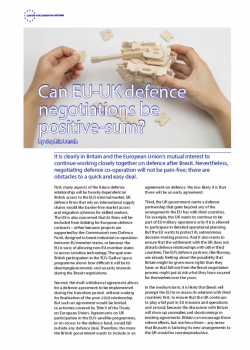
Can EU-UK defence negotiations be positive-sum?
It is clearly in Britain and the European Union’s mutual interest to continue working closely together on defence after Brexit. Nevertheless, negotiating defence co-operation will not be pain-free; there are obstacles to a quick and easy deal.
First, many aspects of the future defence relationship will be heavily dependent on British access to the EU’s internal market. UK defence firms that rely on international supply chains would like barrier-free market access and migration schemes for skilled workers. The UK is also concerned that its firms will be excluded from bidding for European defence contracts – either because projects are supported by the Commission’s new Defence Fund, designed to boost industrial co-operation between EU member-states, or because the EU is wary of allowing non-EU-member-states to access sensitive technology. The spat over British participation in the EU’s ‘Galileo’ space programme shows how difficult it will be to disentangle economic and security interests during the Brexit negotiations.
Second, the draft withdrawal agreement allows for a defence agreement to be implemented during the transition period, without waiting for finalisation of the post-2020 relationship. But such an agreement would be limited to activities covered by Title V of the Treaty on European Union. Agreements on UK participation in the EU’s satellite programmes, or on access to the defence fund, would fall outside any defence deal. Therefore, the more the British government wants to include in an agreement on defence, the less likely it is that there will be an early agreement.
The UK is concerned that its firms will be excluded from bidding for European defence contracts.
Third, the UK government wants a defence partnership that goes beyond any of the arrangements the EU has with third countries. For example, the UK wants to continue to be part of EU military operations only if it is allowed to participate in detailed operational planning. But the EU wants to protect its autonomous decision-making process. And it also wants to ensure that the settlement with the UK does not disturb defence relationships with other third countries. The EU’s defence partners, like Norway, are already fretting about the possibility that Britain might be given more rights than they have, or that fall-out from the Brexit negotiation process might put at risk what they have secured for themselves over the years.
In the medium term, it is likely that Brexit will prompt the EU to re-assess its relations with third countries: first, to ensure that the UK continues to play a full part in EU missions and operations; and second, because the discussion with Britain will show up anomalies and shortcomings in existing agreements. Britain can encourage these reform efforts, but not force them – any sense that Brussels is ‘tailoring’ its new arrangements to the UK would be counterproductive.
In the meantime, the UK and the EU will have to negotiate the conditions under which the UK can supply troops to EU missions and operations and continue to participate in the research and development of defence capabilities.
In the medium term it is likely that Brexit will prompt the EU to re-assess its defence relationships with third nations.
Being plugged into EU operations matters to Britain less because of their operational value than because the UK has an interest in influencing the EU’s strategic direction, regional priorities and level of ambition. The UK also wants to prevent EU-NATO duplication. In order to be able to remain part of the EU’s defence debate, however, Britain will have to demonstrate its commitment to the EU’s military efforts. The UK could negotiate an agreement to provide troops and assets to the EU – such as Britain’s strategic airlift capability, which helps the EU deploy more rapidly – in exchange for close consultation and information sharing in the early stages of EU operational planning.
The UK should also seek an administrative agreement, similar to Norway’s, with the European Defence Agency (EDA), which oversees EU defence capability development. It would not have full voting or veto rights, but could contribute to EDA projects and attend some committee meetings. And it should negotiate arrangements with the EU that allow UK organisations to tender for EU projects within the Defence Fund and the next framework programme for research and innovation. If it wants to protect British firms’ participation in European defence co-operation, Britain will also have to conclude an information-sharing agreement with the EU.
If the EU excludes the UK from the Union’s defence infrastructure, it would not only lose British expertise and capabilities, but also potentially undermine its own ambitions. In order to be credible, EU defence structures need the involvement of the UK, one of the few European powers with serious military capacity. But some in the EU see Britain’s decision to leave as an attack on the fundamentals of European co-operation and no longer trust the UK as a strategic partner. What is more, the UK’s threat to launch a competitor to Galileo suggests to EU hardliners that London’s commitment to European security co-operation is thinner than Theresa May has repeatedly promised.
Some in the EU no longer trust the UK as a strategic partner.
The UK, in turn, would not benefit from distancing itself from the EU’s defence structures. But there is a lack of tolerance in the UK for the EU’s legal and political red lines. Some in Britain also mistrust other EU member-states, as they feel that their defence industries are seeking to benefit from Brexit.
Both sides need to be careful to prevent what should be a positive-sum game from turning into a zero-sum one.
Sophia Besch is a research fellow at the Centre for European Reform.


Comments